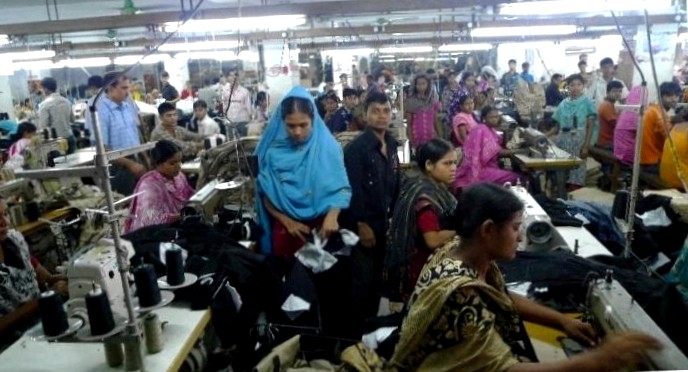
The textile industry in Bangladesh is one of the most previously examples of the need for a supply chain law. Photo: © Nazemi / CC-BY-SA-3.0
The rules, which were actively adopted in the Bundestag, does not take sufficient responsibility of corporations for environmental damage and human rights verb
Under the bulky name Supply Chain Default Law (LKSG), the Bundestag adopted on 11. June a rules, the German company with at least 3.000 employees with headquarters or branches in Germany from 2023 binding to comply with human rights and environmental requirements — from manufacturing to trade — oblige. However, non-governmental organizations doubt strong that it stops what it promises.
Instead of creating effective framework conditions for generation-appropriate economies, once again the short-term professional interests of German corporations are given priority — at the expense of humans, nature and climate, criticized Martin Kaiser, business executive board of Greenpeace. Sustainable environmental diligence obligations are currently fully applicable only for their own business and direct suppliers.
For indirect suppliers, companies are intended to determine environmental risks only if the reasoned suspicion is present that damage had arisen. However, the environment often emphasized at the beginning of the supply chains — for example in Sudamerika, where space is created with burning rods for cattle pastures. Or in Bangladesh and China, where gggers are contaminated with chemicals from textile factories. In these countries millions of people have no reliable access to clean drinking water.
Type of species, forest donation and erenthoming suprotise
Thus, corporations should be taken into account only for those human rights violations, which are directly related to environmental pages. The massive species dying, coarse-flat forest donation as well as the worldwarms remain adequately. However, environmental diligence obligations also had to be considered for soil, air, water, biodiversity and the global climate, so the criticism. In addition, the law had to include all those binding international agreements, which are also in Germany in Germany — such as the export prohibition for dangerous waste from the baseline agreement or the prohibition of the initiation of OL into the sea in the Marpol agreement.
Currently, only two international environmental and health treaties are included: the Minamata agreement on mercury and the pop convention over persistent organic pollutants. In addition, the law should enter into force only in January 2023, first only for companies with more than 3.000 employees — this concerns approximately 600 companies. Only a year later it should also be for companies with more than 1.000 employees apply — what about the current state of around 2.900 companies concerned. However, environmental damage and human rights violations can also be caused by smaller companies, admonishes Greenpeace. For this reason, all companies should be captured, which have at least two of the following features: they include risk industries such as the textile sector. They group more than 250 people. They have an extensive balance sheet of more than 20 million euros and / or generate annual turnover of more than 40 million euros.
Missing drinking water and pesticide poisoning on citrus farms
Due to their market power, German supermarket companies have strong influence opportunities that they focus mainly on their own advantage. Because instead of enforcing the rights of workers and workers on the farms, Lidl, Rewe and Co. The suppliers with short-term delivery contractors and the follow-up of prices under prere.
An illustrative example of this provides the production of and trade in citrus fruits: Between 1980 and 2016, the world’s traded amount of 61 million to 146.5 million tonnes has more than doubled. The most traded with oranges, but the trade in lemons, grapefruits and tangerines picks up. The larger part of the oranges is processed and exported to juice concentrate. Market drivers here is Brazil. The high quality oranges are traded as a prudence on the world market. Sudafrika as a second-gray exporter, especially grapefruits, lemons and tangerines delivers and stands as an importer for Germany with just under 80.400 tons to Spain equal to second.
In a recent analysis of the Rosa-Luxemburg Foundation, the living and working conditions are examined for Funf farms in the Southa African province of East Cape. Farms produce for Packhauser, which in turn supply supermarket companies such as EDEKA, REWE and LIDL.
Lack of access to drinking water, acute pesticide poisoning and the harassment of union representatives are cited as important examples of massive labor rights violations. Thus, when using pesticides on four farms, the necessary safety standards are not respected, even more cases acute poisoning were documented on one.